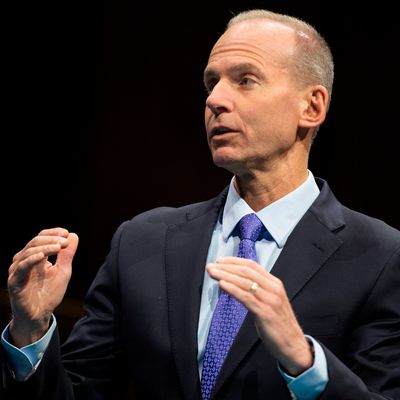
Monday morning Boeing announced the ouster of CEO Dennis Muilenburg, nine months after the grounding of its best-selling 737 MAX jet threw the company into an ever-worsening crisis. In a press statement, the company announced that its board of directors had passed the CEO title to the currently serving chairman, David Calhoun.
Under Muilenburg’s leadership, Boeing had repeatedly reiterated its confidence in the plane and assured the public that any problems would soon be fixed and that the plane would be back in the air. It kept building the planes at an aggressive clip of 42 per month, crowding parking lots in Arizona and Washington State.
Yet the company repeatedly failed to make good on its promise to fix the flaws that led to a pair of deadly crashes. Regulators became frustrated by the company’s lack of transparency and airlines grew angry at its failure to deliver on its problems. Crash victims’ families felt that they were being lied to. As costs mounted into the billions, a series of leaks revealed a pattern of engineering sloppiness and cover-ups. Patience for Muilenburg’s tenure wore thin. In October, Boeing stripped him of his chairman of the board title, but kept him on as CEO.
Many viewed Muilenburg’s continued tenure as a sign that Boeing hadn’t grappled with the seriousness of the crisis. When he appeared before a hearing of the House Committee on Transportation in October, Democrat Jesús García of Illinois lit into him: “You padded your personal finances by putting profits over safety and now 346 people, including 8 Americans, are dead on your watch … I think it’s time that you submitted your resignation, don’t you?”
Instead, Muilenburg hung on. In an interview with Andrew Ross Sorkin of the New York Times, he insisted that since the two accidents “happened on my watch … I feel responsible to stay on.”
That position might have been tenable had Muilenburg been able to deliver some tangible sign of progress. Instead, things got worse. Matters came to a head last week, when the board of directors decided that the time had come to shutter the 737 MAX production line until a clear path forward could be found.
In its statement to the press today, Boeing signaled that it finally understood the fruitlessness of Muilenburg’s nothing-to-see-here approach and was ready to change tack: “Under the Company’s new leadership, Boeing will operate with a renewed commitment to full transparency, including effective and proactive communication with the FAA, other global regulators and its customers.”
That would certainly be a step in the right direction. An attitude of genuine contrition and transparency will be crucial to rebuilding the century-old reputation for reliability that the last nine months had done so much to squander. The question now is how nimbly a $100 billion–plus behemoth can change its ways.






























